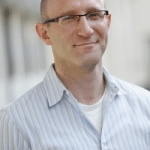 The first time I visited New York City as a high-schooler, I saw a group of teenage boys chasing one another through the street in a rough-looking part of the Bronx. One carried a rusty machete, which, in my retelling back home, helped establish that I had witnessed a gang war. It was probably nothing of the kind, but the story survives in my hometown. After living in New York for several years, I still encounter people who ask, "Don't people chase people with machetes there?" Never mind that my story was exaggerated and implausible; it confirmed what I and others imagined about the city: it was a dirty, crime-ridden metropolis where one was likely to witness gang fights in broad daylight.
The first time I visited New York City as a high-schooler, I saw a group of teenage boys chasing one another through the street in a rough-looking part of the Bronx. One carried a rusty machete, which, in my retelling back home, helped establish that I had witnessed a gang war. It was probably nothing of the kind, but the story survives in my hometown. After living in New York for several years, I still encounter people who ask, "Don't people chase people with machetes there?" Never mind that my story was exaggerated and implausible; it confirmed what I and others imagined about the city: it was a dirty, crime-ridden metropolis where one was likely to witness gang fights in broad daylight.
The machete story is a trivial example of confirmation bias: everyone believed it because it sounded like what they already believed. Confirmation bias is a natural human trait: we're more likely to believe stories and arguments that sound like what we want to hear, and in many case more likely to believe stories from people we trust than we are to believe facts. But our tendency to self-select information that vindicates our opinions has a dark side. It helps us become so convinced of our own position that we lose our capacity for critical judgment, and aids us in constructing grotesque caricatures of our enemies.
In politics, confirmation bias drives and deepens partisan narratives. That's what happened earlier this month when Lila Rose, a student activist from UCLA who has made a stir with undercover stings at Planned Parenthood clinics, released a series of videos that showed an actor posing as a pimp asking Planned Parenthood employees for help getting medical care for underage girls involved in sex work. The conservative media exploded, and pro-life groups barraged journalists with triumphant press releases. Rose said her videos prove "beyond a shadow of a doubt that Planned Parenthood intentionally breaks state and federal laws and covers up the abuse of the young girls it aims to serve." But outside her ideological lens, what Rose unearthed was less conclusive.
Her first video, to be sure, was incredibly damning. Filmed at a New Jersey Planned Parenthood clinic, it showed a counselor discussing sex trafficking with the phony pimp and advising him on how to skirt the law. "For the most part, we want as little information as possible," she said. (The counselor was promptly fired; Planned Parenthood called her behavior "repugnant.")
But the other videos were much less clear. The fake sex trafficking plot the conspirators peddled was vague, and employees at the other clinics simply informed the actors of the services Planned Parenthood could legally offer to hypothetical patients. The "judicial bypass" some of the counselors discussed is a commonly used and perfectly legal loophole for young women who do not have a parent or guardian available to give consent. In almost all of the cases, the employees conducted the conversations according to protocol, outlining the legal requirements for obtaining their services, and notified their supervisors after the actors left. Shortly afterward, Planned Parenthood wrote the Justice Department and the FBI to report the suspicious visitors to their clinics.
To pro-life groups, however, it was an open-and-shut case where such complicating details were too insignificant to bear mentioning. Taxpayers are "funding a criminal abortion enterprise," a Family Research Council action alert shouted, adding that Planned Parenthood was "willing to exploit the victims of child trafficking" to "promote abortion." The National Right to Life called the group a "a hyper-political, under-regulated, out-of-control mega-marketer of abortion as a method of birth control." The president of Life Dynamics said the videos revealed Planned Parenthood is part of "organized crime." Kathryn Jean Lopez of National Review was one of the few to mention that Planned Parenthood notified authorities about the fake pimps, but, taking a cue from Rose, she tried to spin it as the group "covering its tracks."





